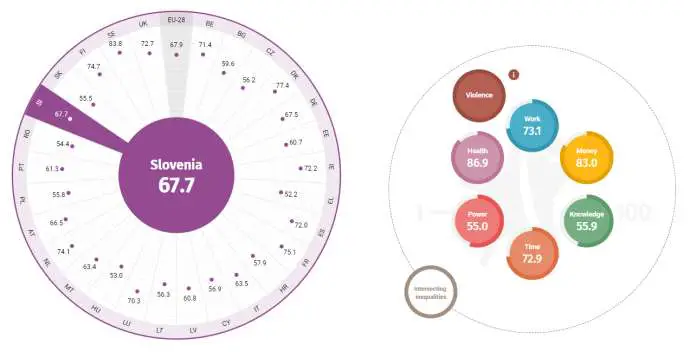STA, 3 November 2020 - Slovenia places 11th in the European Union in the latest Gender Equality Index, the same rank it had in 2019. With a score of 67.9 points out of 100, slightly lower than last year, it is just below the EU average.
The index, compiled by the European Institute for Gender Equality, measures countries' performance across six core domains - work, money, knowledge, time, power and health.
Slovenia's scores are highest in the domains of health (86.9 points) and money (83 points). Its highest ranking is in the domain of time, where it ranks 7th.
Gender inequalities are most pronounced in power (55 points) and knowledge (55.9 points). In these domains, Slovenia ranks 12th and 21st in the EU, respectively.
As the Ministry of Labour, the Family, Social Affairs and Equal opportunities pointed out on Tuesday, compared to last year Slovenia made headway only in the segment money, where average net incomes increased for both men and women, while the at-risk-of-poverty rate for women decreased by 0.4 percentage points.
In the two indicators that measure work - labour market participation and the segregation and quality of work - Slovenia achieved 0.2 points less than the year before due to increased segregation in employment, according to the ministry.
The institute also highlights gender segregation in education. Just over 41% of women study education, health and welfare, humanities and arts, whereas the share of men in these study programmes is 16.8%.
The ministry notes, however, that Slovenia's figures are not significantly different than the EU average.
In the domain power Slovenia reached 2.6 points less than last year as a result of fewer female members of the government, MPs and local councillors. The share of women on the boards of listed companies and the board of the central bank decreased as well.
In health, Slovenia slipped by 0.2 points. According to the ministry, men's self-perceived health is higher than women's, even though life expectancy for women is on average six years higher than for men. Differences in access to health services are minimal.
This year's thematic focus was on digitalisation. The data for Slovenia shows there is significant segregation in the education and labour market with men accounting for over 80% of all ICT graduates and over 70% of scientists and engineers in high-technology sectors.
Slovenia will dedicate special attention to this issue during its stint as the presiding EU country, the ministry said, adding that a responsive labour market is a key priority.
Digital skills are becoming an increasingly important part of the active employment policy and projects such as informal education and on-the-job training, which typically involve a higher share of women, have put new digital knowledge at the forefront, the ministry said.
You can find the full report for Slovenia here






